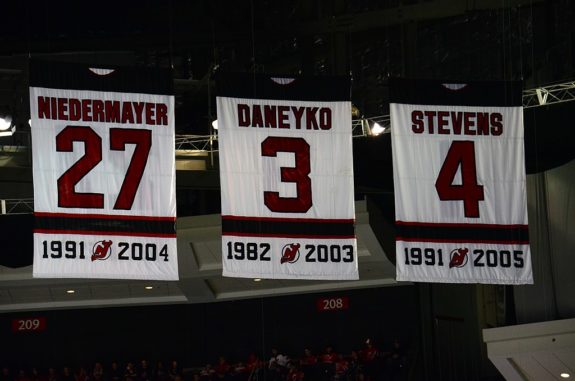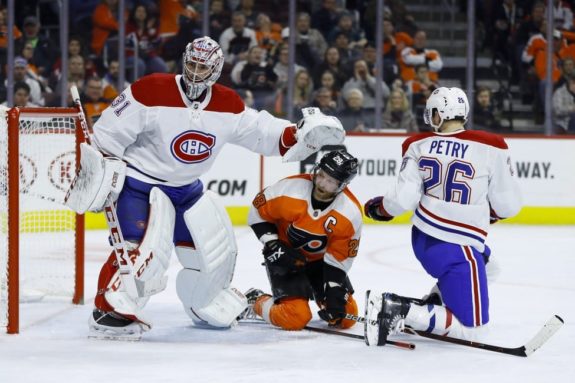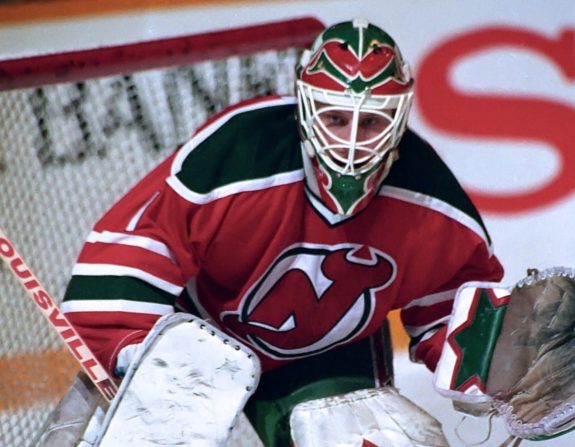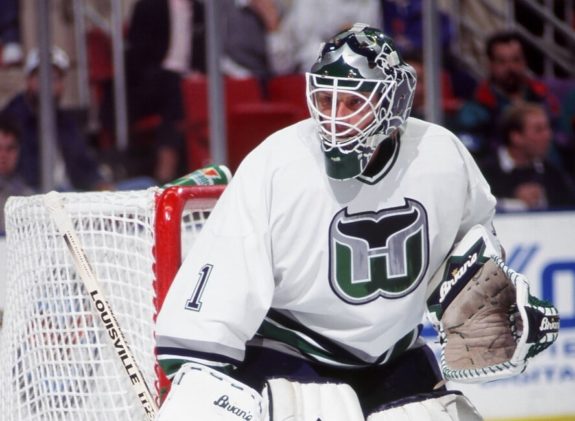Following a playing career that spanned 18 seasons, 820 games, 324 wins, and nine teams/eight franchises, goaltender Sean Burke (a three-time All-Star) retired from professional hockey in 2007. But he has stayed involved with the game that he loves in a different capacity that has been just as fulfilling.
Less than a year after his retirement as a player he joined the then-Phoenix Coyotes as the Director of Prospect Development and he also held the titles of Assistant GM and Goaltending Coach. Eight years later he took a job with the Montreal Canadiens as a pro scout and in July 2017 he was named GM of Team Canada for the Deutschland Cup, the Spengler Cup, and the 2018 Winter Olympics.

His NHL career started with a bang as he backstopped the New Jersey Devils to their first-ever playoff berth back in 1988, with a remarkable 10-1-0 record to close out the regular season. Burke joined the Devils (who drafted him 24th overall in 1985) after suiting up for Team Canada in the 1988 Winter Olympics.
That spring he took New Jersey to the brink of the Stanley Cup Final, falling one game short of advancing past the Boston Bruins after dispatching the higher-seeded New York Islanders and Washington Capitals. That would ultimately be as close as he came to be able to play for the Cup.
After playing 162 games with the Devils he was traded to the Hartford Whalers and stayed with them until they relocated to Carolina. That 1997-98 season he played for Carolina, Vancouver, and Philadelphia. Over the remainder of his career he played for Florida, Phoenix, Philadelphia again, Tampa Bay, and eventually Los Angeles was his last stop in 2007.
Recently I spoke with Burke via phone to get his thoughts on a variety of topics including some of his favorite goalies past and present, his time in New Jersey and Hartford, memorable games, and more.
Puckstoppers
The Hockey Writers: What are your thoughts on how goaltending has changed, if at all since you last played in the NHL?
Sean Burke: I don’t think the style has changed that much, I retired after the 06-07 season. So looking back I think the main area of change has been the amount of time that goalies are down on their knees really. There’s a lot more down (to your knees) with pucks around the goal line, plays from behind the net. So anything that is a stuff-play now, anything that is a wide, down-low play the goaltenders now are almost all automatically down. I think part of that change is the game continues to get faster, players have less time and goalies are really playing the odds.

THW: Do you have a favorite goalie or goalies that you like to watch since you’ve hung your skates and pads up?
SB: I like watching a lot of the guys. I work with Montreal so obviously watching Carey Price is always interesting, always exciting. Tampa’s Andrei Vasilevskiy, for a big guy, the way he moves would be another guy who I enjoy watching. When you are someone who has played and a student of the game I guess I can just enjoy watching any game, I can find things in the game that are interesting.
THW: Who was your favorite goalie or goalies growing up that made you want to be a goaltender?
SB: I had a few. I grew up in Toronto, so The Toronto Maple Leafs were the team I saw most often. I liked Mike Palmateer when I was a kid, but I also liked Bernie Parent, Ken Dryden, Rogie Vachon. I was a real fan. I was a kid who loved the game so I watched a lot of hockey and I emulated a lot of different guys. Those were definitely goalies that when I was really getting excited about the game, those were definitely four guys that I watched a lot of.
Trial By Fire
THW: When you think about your time with the New Jersey Devils what are some of the first memories that come to mind?
SB: Well obviously the playoff run that we went on in the 1988 season there, just the way that the team came together at the right time. We were able to carry that momentum right on through to the semifinals. That was obviously for me, my indoctrination into the NHL and it was all a blur by the time it was over. Those guys, those teammates that you go through that with, is always at the top of the list.

THW: As such a young player going through all of that and then your coach Jim Schoenfeld gets suspended in midst of the Bruins series, what’s going through your mind at that time?
SB: Looking back, as an athlete when you’re in that situation, you’re always caught up in and focused on what you have to do yourself. There are always external things that are going on that are a part of it, but I don’t think you can get too wrapped up in it. That year was such an incredible year with so many different highlights down the stretch and through the playoffs, that there was nothing really surprising by that point.
THW: Any bitterness in seeing New Jersey win the Stanley Cup a few years after you were traded to Hartford?
SB: No, not really. I wouldn’t say there was any bitterness. I asked to be traded and ended up going back to play in the Olympics again before I did get traded. Looking back, there were things about that whole situation that I may have handled differently – if you were older, more mature. But having said that, the experiences I got through that whole thing like being able to go back to the Olympics, were all things that I look back fondly on.
Brass Bonanza
THW: A lot of people who may read this don’t remember seeing the Hartford Whalers but what are some of your memories from your time with that franchise?
SB: It was an interesting five years for me because it was an enjoyable place to play in terms of your family and a good place to live in. The Whalers, we had a really loyal fan following, and really other than college basketball we were the only game in town. We were treated very well. People were very respectful of the players and the team. I remember that. I wish I could say I remember us winning and having a lot of success but we were in a tough division. We were competitive, we played hard, and we were very close to making the playoffs a couple of times. But as far as our on-ice success, we just didn’t have a lot of it. An enjoyable place to play, with a lot of really good teammates and coaches.

THW: What is the most memorable game that you played in?
SB: I wouldn’t be able to pick just one! Thank goodness I played in so many where it’s not just one that stands out. The last game that the team was in Hartford was obviously memorable in different ways. I do remember that game, the emotion around it, the skate-around we did after the game thanking the fans knowing that the team was leaving. There was quite a bit of emotion attached to that so I definitely remember that game.
Trading Leg Pads for Note Pads
THW: What do you enjoy about your current role?
SB: I think for me, I’ve been very fortunate because I’ve had a lot of different roles since I retired as a player. Now I’m scouting with Montreal but I’ve also had a chance to be the General Manager of the last Canadian team at the Olympics. I’ve done a lot of managing with Hockey Canada. What I enjoy is the challenges of every role you have and the different things you learn along the way, the different phases you go through. As I said, I’ve been very fortunate to have such a variety of experiences, and scouting was something that I didn’t necessarily have an appreciation for as I do now and I’m glad I’ve done that and put that experience on my resume. There’s never any shortage of challenges when you’re working in this business because you can always get better, you can always improve and that’s something I enjoy.
THW: Who would you say you learned from over your career that you have taken into your current roles?
SB: I think you learn, probably without even recognizing it, you learn from everybody. Sometimes you don’t always learn maybe the things you want to do but you learn some things that you do differently. For the most part, I think you’re always learning – like a sponge really and not even knowing half the time. I’ve played for and worked with probably…I can’t even count (laughs)…probably just about every GM. I played for Lou Lamoriello and I learned a lot from him. Looking back, I probably recognize that more now than I did at the time, but I’ve been able to work with George McPhee and Brad Treliving, Jim Nill, Ron Hextall. I’ve worked with a lot of these guys in the last five years through Hockey Canada in teams that I’ve helped manage. Those are all experiences that you take a little bit from everybody and you try to walk away a little bit better than when you first met them.